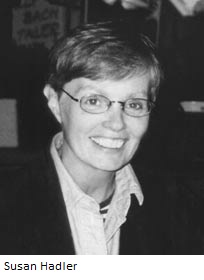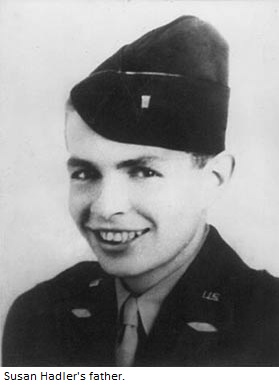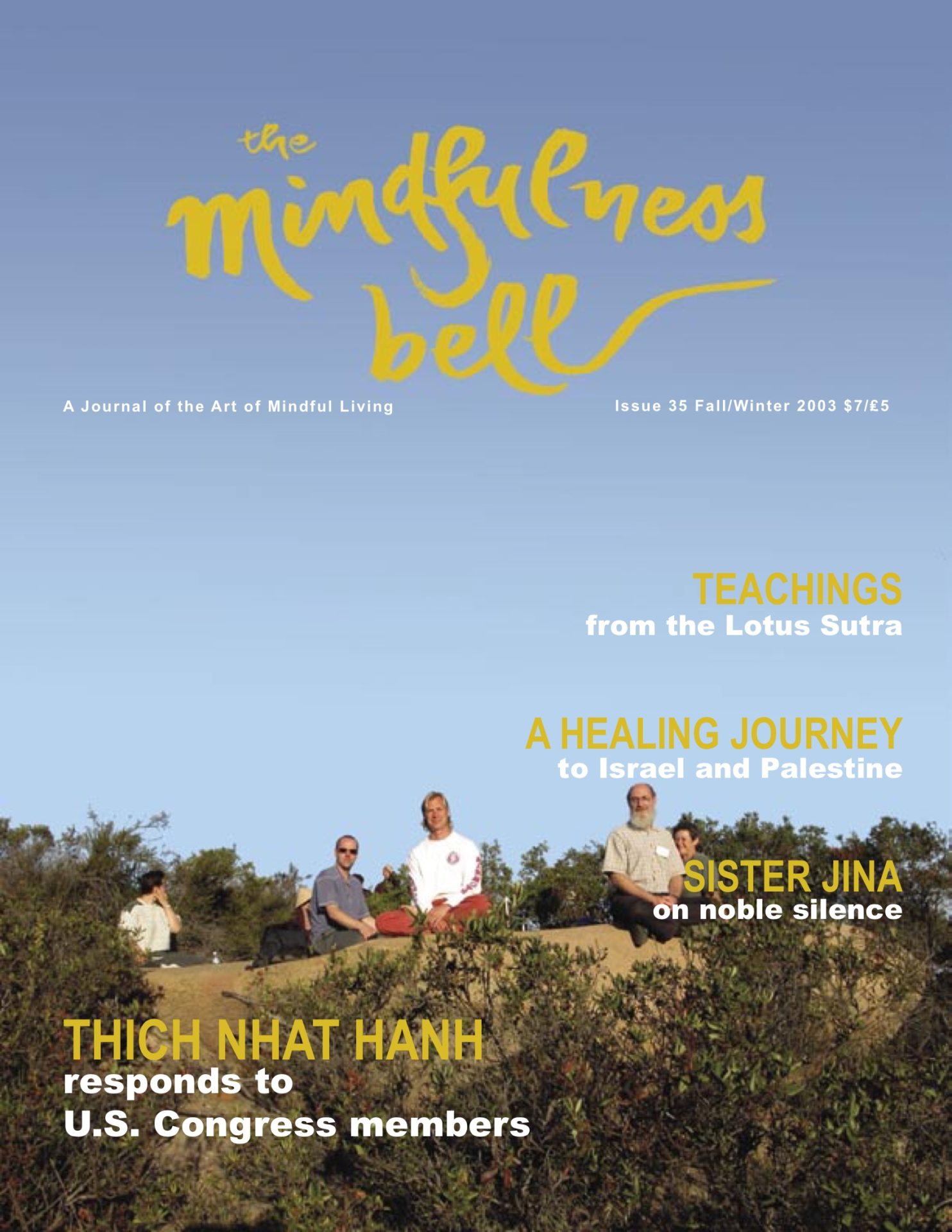By Susan Hadler
Note: Second Body is a practice that is sometimes used to pair Sangha friends who intentionally support one another’s mindfulness practice. In our Sangha, second body pairs usually meet once a week for about four months.
An early morning breeze blows through my cotton jacket as I walk to the metro to meet with my Second Body. I wrap my arms around myself to keep warm,
By Susan Hadler
Note: Second Body is a practice that is sometimes used to pair Sangha friends who intentionally support one another’s mindfulness practice. In our Sangha, second body pairs usually meet once a week for about four months.
An early morning breeze blows through my cotton jacket as I walk to the metro to meet with my Second Body. I wrap my arms around myself to keep warm, but the chill has more to do with yesterday’s trouble than with the spring wind.
Yesterday, eager to begin transcribing tapes of Dharma teacher Anh-Huong’s talks for the book she is writing, I bought a tape recorder and some blank tapes. I put one blank tape into one side of the machine and Anh-Huong’s recorded talk into the other side and pushed the button. When the recording machine stopped, I played back the copy. There was no sound. Nothing but the silent whir of an empty tape. Then I played the original tape. It was gone. The sound of the bell and then Anh-Huong’s serene voice, gone! I had erased the whole talk. There was nothing on either tape. I had lost the entire Dharma talk.
I wanted to turn the clock back and have another chance. This time I would not hurry. I would stop and take three breaths before sliding the tapes into the machine. But that moment had passed and there I was with two empty tapes.
I was thinking about that tape on my way to meet my Second Body. We’d been meeting at the coffee house every Wednesday morning at eight a.m. Trust in my Second Body deepened over the three months we’d been meeting. I remember worrying that I wouldn’t be able to understand him or respond in a way that helped. But then I noticed that when I listened without thinking about how I could help, my Second Body found his way. What “helped” seemed to be that I was sitting there, listening. Alert and present. We were practicing mindfulness together, recognizing and embracing what appeared, watering wholesome seeds and I was learning mindfulness from him, with him. Sometimes I told him what I’d heard. Sometimes I asked a question. He would continue until he came to a deeper understanding. Then he would stop and smile and I would speak.

I began slowly, guardedly. I have one or two little things, I would say. My Second Body listened to me and in his listening I found the space to listen to myself as I spoke. I noticed my awareness growing more consistent and more focused daily knowing that I would talk with my Second Body soon.
Over the months we met, the war on Iraq was heating up and eventually broke out. I read in the newspapers about Iraqi people who were killed and soldiers who died. I felt sad for everyone who lost someone they loved and for all of us. The war opened wounds from an earlier war when my father, a twenty-five year old soldier, was killed in WWII. I was three months old.
As I listened to my Second Body integrate his practice with his daily life, I learned to talk about my experiences of loss from the perspective of the practice. I became aware of the strength of my sorrow and that I had unconsciously watered seeds of sorrow my whole life. And then I noticed a shift. As I focused more on the practice with the help of my Second Body, I became aware of experiences of happiness and of peace. I noticed times of happiness and peace even in the midst of the sadness of war!
April 12th is the anniversary of my father’s death. This year I wanted to be with a Sangha on that day, so I drove to Annapolis for the Day of Mindfulness. During the morning meditation, Anh-Huong suggested that we invite our beloved to sit with us. I invited my father. Until I began to search for information about my father a few years ago, I knew only that he was an only child and the date and place of his death. It was too painful for my family to talk about. So I welcomed the chance to sit there with my father and then I invited my grandparents, my father’s parents.
When I heard the bell of mindfulness signal the end of meditation, I opened my eyes and saw Anh-Huong, her husband Thu, and their nine year old son Bao Thich sitting so peacefully, so happily. For the first time I knew in my heart that my father had been happy. Tears ran down my face as I realized that he had been a happy little boy like Bao Thich, picking up leaves to give his mother, eating ice cream, and swimming in the lake. I was able to see that tragedy had overshadowed happiness. The practice was helping me find and water seeds of happiness and seeds of peace. Seeds of sorrow no longer grew so tall and thick. I could feel sunlight inside.

Now I am on my way to tell my Second Body about the lost tape. We order our tea and hot chocolate and settle into chairs. I tell my Second Body about losing Anh-Huong’s talk, how upset I am. Maybe I should leave the project even though I love it. Maybe I should leave the Sangha if I am so destructive. My Second Body takes a drink of hot chocolate, puts his cup on the table and looks at me. When he speaks, he says, “You need help holding this. You should call Anh-Huong.”
Tears flood my eyes. My Second Body is more concerned about me than what I’ve done. I need help? I’m the one who lost the tape. But I do need help. I feel so grateful for his recognition of my pain. Later I realize that needing another to see where I am blind is the face of interbeing manifest in Second Body practice.
I notice an old fear rising when I think about calling Anh-Huong, fear of upsetting her, fear of silence, fear of blame and rejection when I already feel terrible. But I trust my Second Body. When I get back to my office I call Anh-Huong and leave a message.
After dinner the phone rings. I breathe in and out, in and out, in and out and answer the call. It’s Anh-Huong. After a minute of silence, I tell her that I erased one of her Dharma talks by mistake. I am so sorry. Anh-Huong speaks, “The tape isn’t lost. It’s still in us. It’s still here.” I listen to her words, so full of acceptance and understanding. I tell her, “As I listen to your Dharma talks, I know how meaningful they are. I feel sad to have lost any part of them, sad that others won’t have the chance to hear or read the one I lost.” Anh-Huong says, “It’s all right. It’s part of us.” I continue, “I love typing the talks; listening closely to them is such a joy.” She responds, “So you like it, good.” I feel her concern and notice her delight in my enjoyment of typing the talks. I am filled with gratitude for my Second Body, for Anh-Huong’s understanding and compassion, for the Sangha and the practice, which is more vast than my mistake.
I hang up the phone smiling, aware of many levels of being in that moment. It’s still in us. It’s part of us. It’s empty and it’s here. He’s still in us. He’s part of us. He’s gone and he’s here. No coming, no going.
With help this clenched heart opens. Sorrow flies up to a branch and sings.
Susan Hadler lives in Washington, D.C. where she practices with the Washington Mindfulness Community. She is a psychologist and she enjoys writing.

